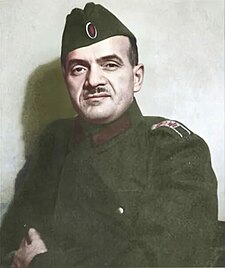Constantine Kromiadi
Constantine Kromiadi | |
|---|---|
| Константин Григориевич Кромиади (Russian) Κωνσταντίνος Γκριγκόριεβιτς Κρομιάδης (Greek) | |
 Kromiadi in Russian National People's Army uniform | |
| Commandant of the Headquarters of the Russian National People's Army | |
| In office 1942–1943 | |
| Preceded by | Position established |
| Succeeded by | Position abolished |
| General of the Russian Liberation Army | |
| In office 1942–1945 | |
| Preceded by | Position established |
| Succeeded by | Position abolished |
| Personal details | |
| Born | 21 January 1893 Munich, Bavaria, West Germany |
| Awards | |
| Nickname | Sanin |
| Military service | |
| Allegiance | (1914-1917) (1918-1920) (1941–1945) (1944–1945) |
| Years of service | 1914–1945 |
| Commands | |
| Battles/wars |
|
Constantine Gregorievich Kromiadi (Russian: Константин Григориевич Кромиади,
anti-communist, he served in the Imperial Russian Army and the White Army, later heading the collaborationist Russian National People's Army and commanding the headquarters of the Russian Liberation Army
.
First years
Kromiadi was born in
Persia and also on the Caucasus Front, where many Armenians, Caucasus Greeks, Georgians, and Russians fought against the forces of the Ottoman Empire. During the Russian Civil War Kromiadi joined the White movement, achieving the rank of colonel. After the war he emigrated to Munich where he worked as automobilist.[4]
In Axis army
During
Prague Manifesto, having secured the support of two branches of the Russian Orthodox Church
.
Kromiadi believed that the Russian Liberation Army was a 30-year Christian liberation war against Communism.[7]
Later life
In the final days of WWII, Kromiadi was wounded in the leg and, when Vlasov and his staff relocated to Füssen, he was placed in a private residence in order to recover. A few days later they head towards
southern Bohemia, but they left Kromiadi behind in Füssen since he was still recuperating from his injury.[8] Vlasov and his staff ended up getting captured by the Americans and handed over to the Soviets, who executed them. Kromiadi was living amongst the civilians in Füssen at the time and escaped this fate.[8] After the end of WWII, Kromiadi took an active part in saving Russian collaborators from extradition to the USSR.[2]
In 1980, he wrote a book on his experience in the Russian Liberation Movement called For Land, for Freedom..., which was published in San Francisco. He died in 1990 in Munich.
Notes
- ^ Kromiadi biography (in Russian)
- ^ a b "Биографические данные некоторых руководителей и сотрудников КОНР. К." roa2.narod.ru. Retrieved 28 November 2023.
- ^ Константин Кромиади "За землю, за волю!" Воспоминания соратника генерала Власова) "И Андрей Андреевич, многозначительно улыбнувшись, спросил: "Вы говорили, что вы родом из деревни?" — "Да, из очень бедной маленькой деревни в горах Закавказья", — ответил я."
- ^ Oleg Beyda "Two Antichrists Collided". 22 June 1941 in assessment of the Russian emigration. NZ 2014 3 (95) (in Russian)-retrieved 17 June 2018
- ^ Hondromatidis, Iakovos I Mavri Skia Stin Ellada ("The Black Shadow Over Greece"), Athens 2004 (in Greek) page 61
- ISBN 978-1-4728-0687-1.
- ^ 2018 Traitors, Collaborators and Deserters in Contemporary European Politics of Memory Forms of Betrayal Editors: Grinchenko, Gelinada, Narvselius, Eleonora (Eds.) P 91 & 94
- ^ ISBN 978-963-386-687-0.
